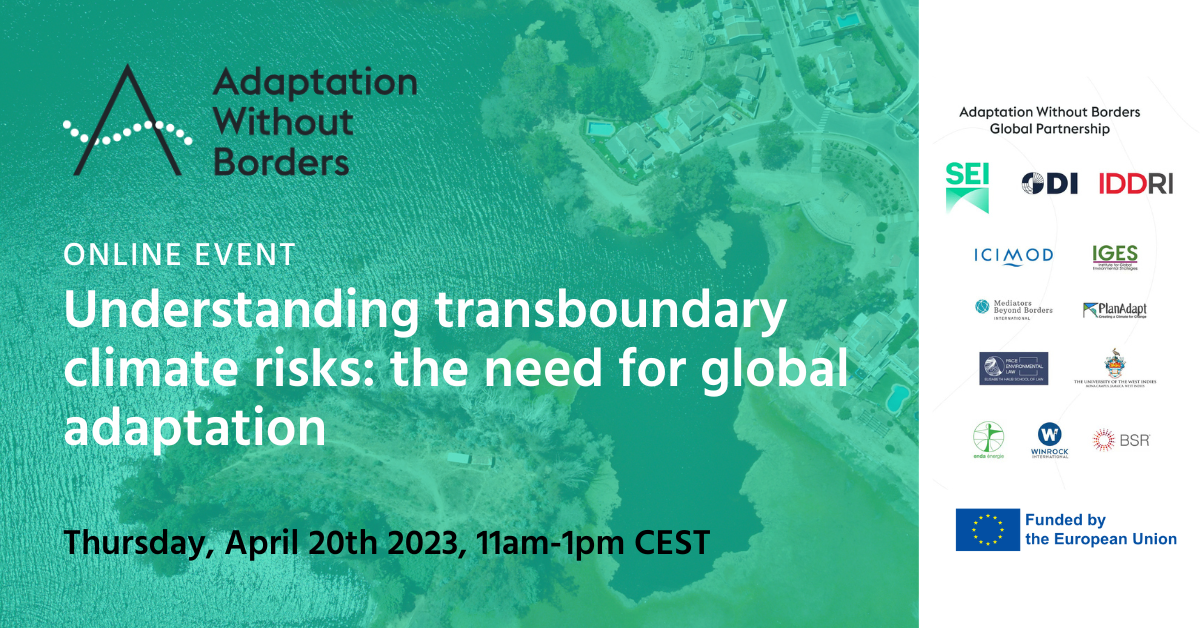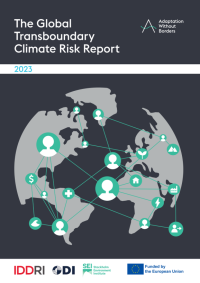Understanding transboundary climate risks: the need for global adaptation

The world’s economies, societies and ecosystems are deeply interconnected, and climate shocks can cascade across countries and continents, sectors and systems.

On April20, organised by IDDRI, Stockholm Environment Institute (SEI) and Overseas Development Institute (ODI) on behalf of Adaptation Without Borders, the webinar "Understanding transboundary climate risks: the need for global adaptation" will discuss key findings from the Adaptation Without Borders’s first flagship report. The report provides new evidence on ten transboundary climate risks of global importance that affect critical sectors and regions: from water resources in high mountain environments, to fish stocks in the open ocean, industrial supply chains, and energy and global finance systems, as well as human health, livelihoods, mobility patterns, and physical and mental well-being.
Authors of four chapters (on terrestrial resources, energy, finance and livelihoods) will set the scene for a discussion on the policy implications of these systemic risks, and on the need for global cooperation on adaptation.
Programme
Moderator: Rebecca Nadin, Director, Global Risks & Resilience team, Overseas Development Institute, UK
- 11:00–11:15 Introduction and presentation of the 2023 Global Transboundary Climate Risks Report
Introduction: Katy Harris, Senior Policy Fellow, Stockholm Environment Institute, Sweden
Presentation of the report: Ariadna Anisimov, Research Fellow, Institute of Development Policy, University of Antwerp, Belgium, and Alexandre Magnan, Senior Research Fellow, Institute for Sustainable Development and International Relations, France
- 11:15–11:45 Four chapters
Shared river corridors in mountain regions: the case of the Hindu Kush Himalaya – Jakob Steiner, Fellow Himalayan University Consortium (HUC/ICIMOD), Nepal, and University of Graz, Austria
Interconnected energy systems: Tropical cyclones on the east coast of Africa - Jinsun Lim, Policy Analyst, International Energy Agency
Global financial networks – Irene Monasterolo, Professor of Climate Finance, EDHEC Business School, Programme Director, EDHEC-Risk Climate Impact Institute, France
Cross border risks to livelihoods – Sarah Opitz Stapleton, Research Associate, Overseas Development Institute, UK
- 11:45–12:15 Q&A
- 12:15–12:35 Implications for policy and practice
Saleemul Huq, Director, International Centre for Climate Change and Development, Bangladesh
- 12:35–12:55 Q&A
- 12:55–13:00 Conclusion
About the Adaptation Without Borders Global Partnership


About the Organizers
Institute for Sustainable Development and International Relations (IDDRI) is a think tank which facilitates the transition towards sustainable development. IDDRI provides expertise on methodologies to assess trajectories of risks and vulnerabilities, including the levers and barriers within adaptation planning and implementation, risk governance and UNFCCC policy.
Overseas Development Institute (ODI) is an independent, global think tank on international development and environmental issues. Through its Global Risks and Resilience Programme, ODI undertakes cutting-edge policy-driven research on the nexus between new and emerging risks to reduce vulnerability and realise a sustainable future for all.
Stockholm Environment Institute (SEI) is an international non-profit research and policy organisation that tackles environment and development challenges. SEI has been a world leader in methodological innovation on transboundary climate risk and plays a central role in several multimillion-dollar research consortia on their assessment and governance.


